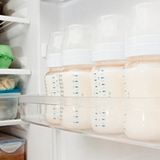How should I store my expressed breast milk at work and at home?

babyadmin |
Once you have expressed your breastmilk at work, you will need to store it at an optimum temperature to preserve the nutrients and antibodies in your breastmilk the best you can. You also need to make sure that you put it somewhere where everyone else in the office is informed of and comfortable with its presence.
Storing milk at work
You can decide for yourself which storing method appeals to you most. One option is to store the expressed breast milk in hard plastic bottles. Another option is to use plastic bags made specially for storing expressed breast milk. Always make sure to label, including the date you expressed the milk, the bottles and bags containing your breastmmilk. This is to make sure that you do not give your baby milk that is past its prime.
Once you have kept your breastmilk in a bottle or bag, you can then put it in the office fridge in the main compartment or the freezer compartment, depending on how long you intend to keep the breastmlk for. If you would prefer not to put the breastmilk in the office fridge, you may like to think of renting a small fridge use solely for the storing of your expressed breastmilk.
Transporting milk from work to home
To transport milk from work to home, you will need to have with you a portable cooler, which could be a cooling bag or a small ice chest. The ice chest could come with ice packs. Sometimes, cooling bags will come with your purchase or rental of a breast pump, so before you rush out to buy one, check if your breast pump comes with one.
It is not wise to leave your expressed breastmilk in the cooler for more than 24 hours. This is because ice or ice packs in a cooler will not keep your breastmilk at their prime as much as putting it in a proper fridge would.
Shelf life of breast milk
After milk has been expressed, it can be kept up to 5 days in the main compartment of the fridge at 4 degrees celcius or lower. If you keep it in the freezer compartment of the fridge, it can last up to 2 weeks. If you decide to use a freezer that keeps its temperature at negative 18 degrees celcius or lower, expressed breast milk can last for as long as 6 months.
Do note that frozen breastmilk destroys some of the antibodies present in fresh breastmilk, as some antibodies cannot survive below a certain temperature. Antibodies help your baby to fight against infections. If this makes you think about using formula milk instead, do note that frozen breastmilk is still better for your baby than formula milk.
Under no circumstance should you use heat on your breastmilk. Once you do so, whether stirring it over a stovetop fire or putting it in the microwave, nutrients in the breastmilk will be destroyed, and your baby will not get the nutrition he or she requires. Be paitent and wait for the breastmilk to thaw. You can thaw the breastmilk in a refrigerator, or to put it in a bowl of warm water. Only thaw what you need, because you cannot refreeze milk that has been thawed or partially thawed.
As most babies prefer their milk at room temperature, you can place refrigerated breastmilk in a bowl of warm water to take away the cold before giving it to your baby.
After every feeding, if the milk is not finished, throw it out. This is because contamination from your baby's saliva might have been introduced to the milk.
